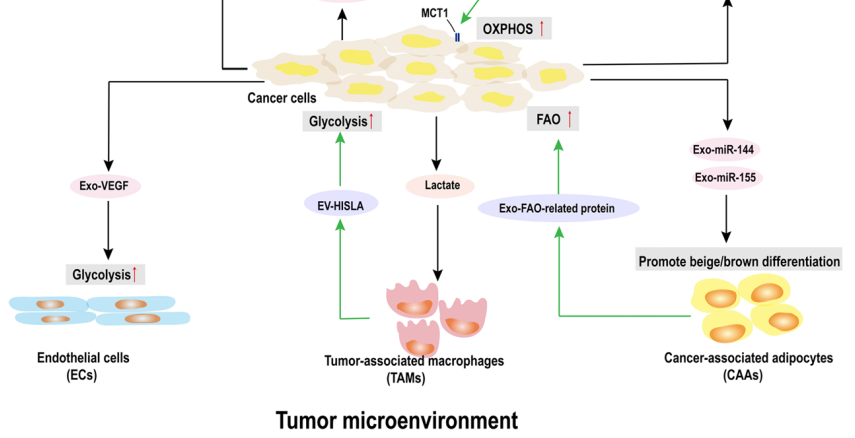Exosomes in cancer metabolism and drug resistance: A review
DOI:
https://doi.org/10.17305/bb.2025.13295Keywords:
Exosomes, tumor microenvironment, metabolic reprogramming, drug resistance, immune evasion, intercellular communication, metastasisAbstract
The transfer of molecular cargo in exosomes plays a crucial role in cancer progression, influencing metabolic processes, angiogenesis, immune interactions, and invasive capabilities. This review synthesizes current evidence on how exosomes modulate tumor metabolism and drive drug resistance, and outlines therapeutic opportunities. We searched PubMed, Scopus, Web of Science, and Google Scholar for English-language studies using terms related to exosomes/extracellular vesicles, glycolysis, oxidative phosphorylation (OXPHOS), lipid metabolism, and drug resistance/chemoresistance, and integrated the literature qualitatively. Evidence indicates that exosomes reprogram tumor and stromal metabolism by delivering enzymes and non-coding RNAs that boost glycolysis and dampen OXPHOS, activate cancer-associated fibroblasts and extracellular matrix (ECM) remodeling, and modulate ferroptosis. They stimulate angiogenesis (e.g., via vascular endothelial growth factor (VEGF)/Wnt pathways) and promote immune escape through programmed death-ligand 1 (PD-L1), transforming growth factor beta (TGF-β), and macrophage reprogramming. Exosomal integrins and proteases contribute to epithelial–mesenchymal transition (EMT), organotropism, and pre-metastatic niche formation. Critically, exosomes propagate chemoresistance by exporting drugs and spreading determinants—including P-gp/BCRP/MRP-1, anti-apoptotic proteins, and regulatory RNAs—to previously sensitive cells; adipose-derived vesicles and lipid cargos further reinforce metabolic plasticity and therapy resistance. Given their stability, nanoscale dimensions, and ability to cross the blood–brain barrier, exosomes are promising vectors for targeted delivery; engineered vesicles can enhance chemotherapy responsiveness and counteract resistance, particularly alongside immunotherapy. In summary, interventions that disrupt exosome biogenesis, cargo loading, or uptake—paired with engineered exosomes for precision delivery—could mitigate drug resistance, metastasis, and immune evasion and advance more effective cancer treatment.
Citations
Downloads

Downloads
Published
Issue
Section
Categories
License
Copyright (c) 2025 Ousman Mohammed, Masresha Ahmed Assaye, Ermiyas Alemayehu, Abdisa Tufa, Solomon Genet

This work is licensed under a Creative Commons Attribution 4.0 International License.









